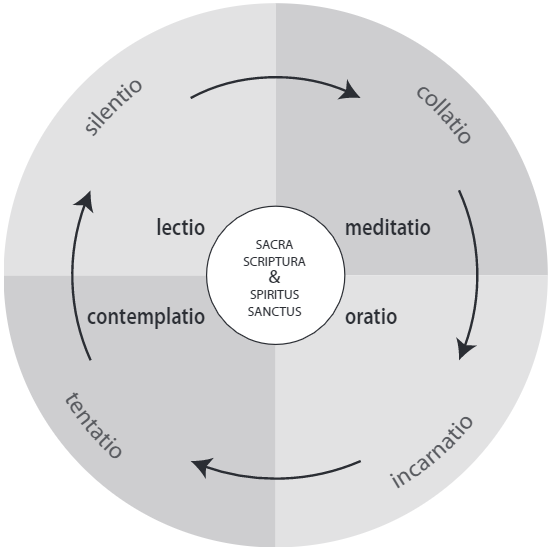Lesson 9: Deepening Lectio Divina

(Colossians 3:2,3)
In this lesson we will conclude discussing lectio divina. There are more things to learn about lectio divina, and more things to practice! But that’s for some other time.
9.1 A circle
So far I have talked about four steps that together form the process of lectio divina. I also mentioned that the steps can be intertwined. Now I would like to add that perhaps you can view the steps as a circle that you are going through.

Lectio divina is a way of examining Scripture that keeps you moving within this circle. You can go through this process multiple times. You can also skip a step or go back to a previous one.
In the center of the circle are two Latin phrases that together represent the core of lectio divina. Sacra Scriptura means Sacred Scriptures. Spiritus Sanctus means Holy Spirit. Lectio divina is always about Word as well as Spirit, Spirit as well as Word!
You will also see four new words. I will now explain those further.
9.2 Internal struggle and silence
I will start my commentary with the concept of ’tentatio’. Because that is where the search began for the deepening I believe was necessary when it comes to lectio divina.
The word ‘contemplatio’ can suggest that lectio divina always provides a beautiful, joyful and restful reading experience. But that’s not true.
I entered upon this train of thought by three words of Martin Luther. When questioned how one could recognize a good theologian or a good Christian, his answer is threefold: oratio (prayer), meditatio (contemplation) and tentatio (temptation).
If you compare these three words with the four of lectio divina, you see that the word lectio is missing (I suppose it was so obvious to Luther he felt he did not have to mention it again) and also that the word tentatio has taken the place of contemplatio. It seems Luther meant to say: the words of God do not (always) grant an experience of joy, gratitude, and wonder, but often cause internal struggle. God’s words are frequently at odds with our lives and require submission.
Personally, I don’t want to assert it has to be either contemplatio or tentatio: both experiences have their legitimate place in engaging with the Word of God. They are complementary to each other, they need and complete each other.
Once I recognized the concept of tentatio as a supplement to contemplatio, I also started looking for additional words for the other three concepts. For lectio I found silentio, collatio for meditatio, and incarnatio for oratio.
By the way, I can understand if all the Latin leaves you feeling a little light-headed. However, I choose to use the Latin terms to give you a taste of something that is time-honoured and established. With the practice of lectio divina we place ourselves in an age-old tradition. The church of the future has roots in the past.
9.3 Silentio, collatio and incarnatio
Placed beside lectio is the word silentio. It means silence. Lectio indicates: it is words that engage us in lectio divina. Silentio means: alongside those words we also really need silence in order to hear them properly.
I have put collatio next to the concept of meditatio. Meditatio is about taking in the words of the text and thinking them over, in your own mind. Collatio could be translated as collectively meditating out loud. The word collatio was used by a movement for religious reform in the fourteenth century called Devotio Moderna, or Modern Devotion. It was used to describe small gatherings where a group of people listened to God’s word together for religious deliberation. Collatio is therefore quite different from a debate or a seminar. It is about speaking vulnerably and from the heart, and about listening to what God’s Spirit has to say and wants from our lives. The things one learns and discovers during this process are shared with others, to discover the wisdom of God together.
And next to the concept of oratio we have incarnatio. Oratio, as a prayer, requires an addendum to move people into action. The well-known monastic collocation ora et labora resonates in the background: pray and work. For the aspect of working I chose a somewhat different concept here; that of incarnatio. Taken literally it means: becoming flesh (that is: becoming human). This refers to Jesus Christ, who became man among people. (see John 1:14) With the word incarnatio I make clear that the purpose of reading and praying the word of God is for those words to be turned into action. Lectio divina is not about the pursuit of precious moments with God’s Word, but about the desire to be molded by those words into a person who becomes more and more like Jesus in mind, word and deed. And for this to be expressed in our daily lives, our daily encounters and activities. So there, in our day-to-day existence, we may increasingly become humans created in God’s image.
Reflecting
1. Which aspect of this chapter’s examination of lectio divina helped you gain an even better insight into what lectio divina is exactly?
2. What experiences have you had with temptation and inner struggle when it comes to practicing lectio divina?
Practicing
I invite you to practise lectio divina with John 15:16 this time.
You did not choose me,
but I chose you
and appointed you
that you should go
and bear fruit
and that your fruit should abide,
so that whatever you ask the Father in my name,
he may give it to you.
If you like to, you can use the timer.
Choose your ’timer’:
Before the lectio divina you could listen to the Gregorian chant ‘Veni Creator Spiritus’.
In the next lesson, we will start with the second contemplative practice that is central to this book: the Jesus Prayer. Lessons 10-15 will be devoted to that. In lesson 10 you will also become acquainted with the Jesus space. To conclude this section on lectio divina, one last quote.
Inspiring quote
A short quote again this time, about prayer in general. Timothy Keller wrote the following in his book ‘Prayer: Experiencing Awe and Intimacy with God’ (2014):
Prayer is the only entryway into genuine self-knowledge. It is also the main way we experience deep change – the reordering of our loves. Prayer is how God gives us so many of the unimaginable things he has for us.
